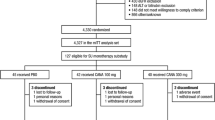Abstract
Objective: The efficacy and tolerability of acarbose were examined in a postmarketing surveillance study of 27 803 patients with diabetes mellitus (26 044 were diagnosed as having type 2 diabetes) over a 12-week treatment period.
Patients and methods: Overall efficacy data were reported for type 1 and type 2 diabetes, and a detailed data analysis was conducted for patients with type 2 diabetes. Tolerability was described for the total group. Of the type 2 diabetes patients, 37.6% were treated with diet only; 44.2% were additionally treated with sulphonylureas; 6.3% with metformin or metformin plus sulphonylurea; and 11.6% with insulin alone or in combination with oral treatment. The frequency of two or more concomitant diseases was 45.8% for all type 2 diabetes patients, and 62.4% in elderly patients (age ≥70 years).
Results: In patients with type 2 diabetes, acarbose administration in addition to the existing treatment resulted in reductions in mean blood glucose levels (fasting 50 mg/dL, lh post-prandial [pp] 60 mg/dL, 2h pp 56 mg/dL), glycosylated haemoglobin (HbA1c 1.3%; HbA1 1.6%) and bodyweight (1.5 kg). Results for type 1 diabetes patients were similar. No clinically relevant influence of age, body mass index or number of concomitant diseases on the results could be observed. Tolerability was good: 83% of patients had no adverse events, 13.7% reported flatulence, and 2.2% had at least one occurrence of diarrhoea. Hypoglycaemia was found in 0.07% of patients, mainly in combination with metformin or insulin. Tolerability was independent of patients’ age. Laboratory investigations gave no indication of other adverse events.
Conclusion: This postmarketing surveillance study documents the therapeutic benefit and good tolerability and compliance of acarbose as mono- and combination therapy, even in elderly and multimorbid patients.













Similar content being viewed by others
Notes
The use of trade names is for product identification purposes only and does not imply endorsement.
References
Lebovitz HE. α-Glucosidase inhibitors as agents in the treatment of diabetes. Diabetes Rev 1998; 6: 132–45
Spengler M, Cagatay M. Bewertung der Wirksamkeit und Verträglichkeit von Acarbose durch Anwendungsbeobachtung. Diab Stoffw 1992; 1: 218–22
Braun H, Belser F. Inhibiteur de l’alpha-glucosidase chez le diabétique. Efficacité et tolérance de l’acarbose en practique courante. DIA/GM (Swiss) 1994; 9: 654–6
Spengler M, Cagatay M. The use of acarbose in the primary-care setting: evaluation of efficacy and tolerability of acarbose by postmarketing surveillance study. Clin Invest Med 1995; 18: 325–31
Bergamini L, Cocilov L, Giorgino R, et al. Acarbose in non-insulin-dependent diabetic patients in routine clinical practice: results from a multicentre study. Ann Exp Clin Med 1997; 1–2: 45–51
Mertes G. Efficacy and safety of acarbose in the treatment of type 2 diabetes: data from a 2-year surveillance study. Diabetes Res Clin Pract 1998; 40: 63–70
Buse J, Hart K, Minasi L. The PROTECT Study: final results of a large multicenter postmarketing study in patients with type 2 diabetes. Clin Ther 1998; 20: 257–69
Mertes G. Safety and efficacy of acarbose in the treatment of type 2 diabetes: data from a 5-year surveillance study. Diabetes Res Clin Pract 2001; 52: 193–204
Standl E. Die Angiopathien des Typ-2-Diabetes. Verh Dtsch Ges Inn Med 1986; 92: 579–86
Standl E, Stiegler H, Janka HU, et al. Risk profiles of macrovascular diseases in diabetes mellitus. Diab Med 1988; 14: 505–11
Nationale Versorgungsleitlinie Diabetes mellitus Typ 2, 1. Auflage Mai 2002, ÄZQ-Redaktion Versorgungsleitlinien, Aachener Str. 233–237, D-50931 Köln
Laube H. Acarbose: an update of its therapeutic use in diabetes treatment. Clin Drug Invest 2002; 22: 141–56
Breuer HWM. Review of acarbose therapeutic strategies in the long-term treatment and in the prevention of type 2 diabetes. Int J Clin Pharmacol Ther 2003; 41: 421–40
Van de Laar FA, Lucassen PL, Akkermans RP, et al. α Glucosidase inhibitors for patients with type 2 diabetes: results from a Cochrane systematic review and meta-analysis. Diabetes Care 2005; 28: 154–63
Hollander PA. Acarbose: adverse events and safety profile. Drug Benefit Trends 1996; (Suppl E) 8: 46–54
Acknowledgements
The authors thank Bayer Vital GmbH, Leverkusen, Germany, for funding the study and Datan, Havixbeck, Germany for data processing.
Author information
Authors and Affiliations
Rights and permissions
About this article
Cite this article
Spengler, M., Schmitz, H. & Landen, H. Evaluation of the Efficacy and Tolerability of Acarbose in Patients with Diabetes Mellitus. Clin. Drug Investig. 25, 651–659 (2005). https://doi.org/10.2165/00044011-200525100-00004
Published:
Issue Date:
DOI: https://doi.org/10.2165/00044011-200525100-00004




